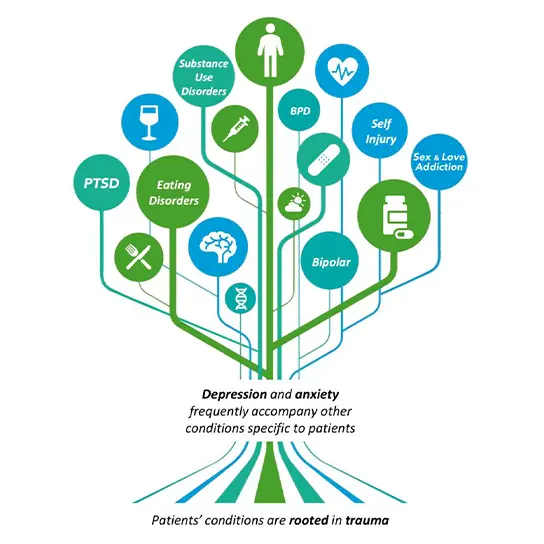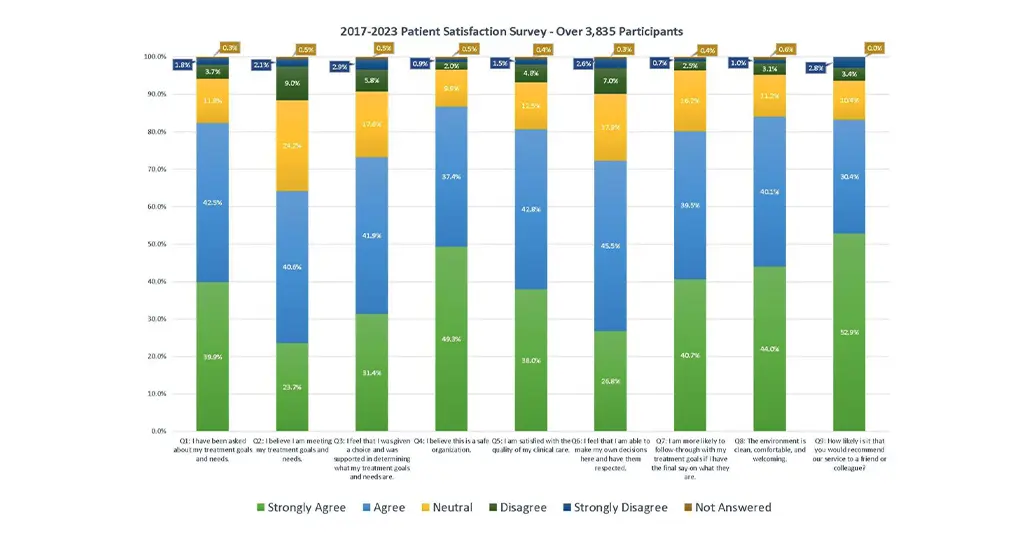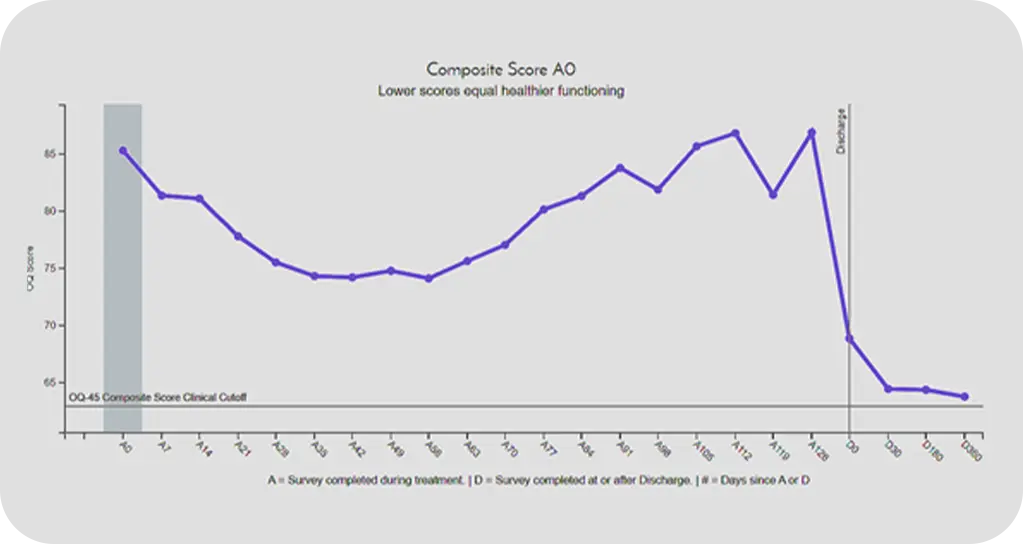Residential Treatment Center for Intensive Patient Care
A residential treatment center is an in-person, therapeutic setting where patients stay overnight to receive an intensive level of care for an extended period of time as part of a structured residential treatment program. This extended treatment program allows individuals to deeply immerse in trauma recovery and learn skills that set the foundation for a journey to a more well-balanced and self-fulfilled life.
The Value of Residential Treatment Center
Addiction, trauma, eating disorders, and related co-occurring mental health disorders tend to be family system diseases. An individual receiving care may not be the “sickest” in their family system, but they are the identified patient looking to improve their mental well-being through residential treatment.
In day treatment programs, such as Intensive Outpatient Programs (IOP) or Partial Hospitalization Programs (PHP), clients go home after programming. The home environment needs to be safe, stable, and conducive to supporting all of the progress we make during the day. For those who need extra support, particularly in the evening, a residential treatment program is considered.
A residential treatment center provides the space needed to get out of an unhealthy and/or toxic home environment and optimize the work we do in treatment. Having 24/7 access to you in residential treatment allows our team to help you identify roles taken on in family life that may carry over into treatment, such as the caretaker, or unhealthy behaviors, including codependency and gossiping. We then work on those behavioral issues and develop a treatment plan that addresses individual needs.
Video: Redefining Residential Recovery Through Compassion and Clinical Excellence
Led by Kim Dennis MD, CEDS, one of the nation’s leading psychiatrists, our residential program offers a safe, supportive environment for individuals facing complex co-occurring mental health, eating disorder, and addiction challenges, guided by expert psychiatric care and a holistic path to healing.
Why Choose Residential Treatment vs Outpatient Treatment Options?
The treatment of a physical malady is typically predicated on the severity of the problem. Consider a leg injury: a sprained ankle needs only an Ace bandage; a fractured tibia requires a cast; a completely torn MCL necessitates surgery to heal.
Issues of a psychiatric nature such as disorders or addictions are similar: one size does not fit all. Mild anxiety in an adolescent could be cured with outpatient therapy. This is one-on-one treatment provided by a trained counselor. Substance abuse in a college student may respond well to an intensive outpatient program, in which the person receives individual counseling and participates in groups. An eating disorder in a new mother could be effectively dealt with in a partial hospitalization program. This is much like intensive outpatient but demands more time each week.
However, when a psychiatric illness becomes very complicated or when two or more addictions or disorders are in play, a higher level of care at residential treatment centers or a specialized residential treatment program is often indicated.
Individualized Residential Program in Chicago, IL for Mood Disorders, Eating Disorders, Substance Use, and Trauma/PTSD in a Confidential, Clean, Safe Environment.
What Does SunCloud Health Treat at Our Residential Treatment Center?

A Unified, Integrated Treatment Model
Our residential treatment program specializes in treating patients who struggle with complex co-occurring mental health conditions, such as disordered eating, substance abuse, mood disorders and related trauma. Our residential treatment program approach is integrated and ideal for people who don’t fit nicely in to a “treatment box” at other treatment centers that may specialize in one diagnosis and not the entire person.
In fact, most patients admit to our residential treatment program with co-occurring disorders. We don’t track people based on a “primary” diagnosis; our residential treatment centers model treats the whole person. We offer more than just medicine, taking a holistic behavioral health approach that treats the entire body by incorporating therapies such as art, yoga, movement therapy, expressive therapy, focus and process groups, and other therapy sessions for physical and emotional support.
Residential treatment programs also incorporate therapeutic outings, typically outdoors, weather permitting. These may include trips to the beach or care-specific activities, like a cooking outing to help those in eating disorder treatment learn healthy habits and coping skills. No matter the outing or therapy group, we ensure a full, well-rounded experience that helps heal the patient’s mind and body. You’re not stuck in four walls listening to someone preach or teach all day, but learning to see yourself as an individual as you explore the lessons learned, the feelings that came from a trip or group, and more to help you and your treatment team move forward with a truly personalized treatment plan.

Our Highly Experienced Residential Treatment Care Team Is Designed Around Our Patient’s Conditions
Led by one of the nation’s most highly respected psychiatrists, Kim Dennis, MD, our multidisciplinary team has nearly 100 years of combined experience delivering residential treatment. Many have worked together for nearly 20 years and each brings a unique gift rooted in a deep compassion for improving the lives of the patients we treat. From our clinical director to addiction specialists, intensive treatment experts to nutritionists, our residential staff has the expertise to address mental health issues utilizing evidence-based mental health therapy sessions that target whole-body healing.
Our residential treatment center features 42 residential beds for adults 18+ in our overnight facility in Northbrook, serving individuals seeking residential treatment in the Chicago area. Our residential treatment model is integrated and comprehensive, with a laser-like focus on eating disorders, substance use disorder, process addictions, mood disorders, and related trauma. Residential level of care is for those who need 24/7 support in a structured residential treatment program.
In 2023, we expanded our residential treatment programs with a specialty unit focused exclusively on co-occurring eating disorders and substance use disorders.
Video: Why Open a Specialty Unit for Co-occurring Substance Use and Eating Disorders?
Kim Dennis, MD, CEDS, tells us about the new specialty unit offering treatment programs for co-occurring eating disorders and substance use. This innovative center is the first of its kind specializing in treating co-occurring disorders for a more comprehensive approach to recovery.
A Focus on Nutrition in Residential Treatment
Included in our residential treatment program is a complete dietary plan consisting of 3 meals and 3 snacks, with a mix of catered and in-house prepared food.
Residential Treatment Gallery – Inside our residential treatment center
Patients are treated in a clean, warm, creative environment, supervised by our team of integrated professionals. Our residential care center was created with our patients in mind: lots of open space; soft, tranquil colors throughout; and comfortable living spaces to relax, journal, or read a book. There is a clear division between male and female rooms.
Individualized Residential Treatment Programs for Mood Disorders, Eating Disorder Struggles, Substance Abuse, and Trauma/PTSD in a Confidential, Clean, Safe Environment.
Our Residential Treatment Level of Care is Integrated, Holistic, and Comprehensive
As such, our residential treatment program provides a full continuum for eating disorders, trauma, and addiction via multiple levels of care that may include evidence-based individual and group therapy, family therapy, process groups, cognitive behavioral therapy, dialectical behavior therapy, family therapy, and experiential therapies such as, art, dance, yoga along with outdoor activities and local excursions. Patients receive psychiatric care and assistance from a dietician when appropriate.
We also offer Partial Hospitalization Programs (PHP), Intensive Outpatient Programs (IOP), and traditional outpatient for people as they step up to, or step down from, residential treatment. We are able to support people as they need more or less throughout their recovery journey.
We provide integrated residential treatment because our patients need it. In 2024:
- 26% of all SunCloud patients had a dual diagnosis of an eating disorder (ED) and a substance use disorder (SUD)
- 44% of patients had a trauma and substance use disorder (SUD) diagnosis
- 26% of patients had a trauma and eating disorder (ED) diagnosis
- 90% of patients were diagnosed with 3 or more diagnoses
- 65% of patients had a diagnosis of a trauma and stressor-related disorder
- 73% of patients had a diagnosis of depression
- 32% of patients had a diagnosis of post-traumatic stress disorder (PTSD)
- 44% of patients had a trauma and substance use disorder (SUD) diagnosis
- 24% of patients had an eating disorder (ED), mood disorder, and trauma diagnosis
- 39% of patients had a substance use disorder (SUD), mood disorder, and trauma diagnosis
Our Residential Treatment Program Is Affordable and In-Network
Our residential treatment program is in network with most commercial payers, including BCBS, Aetna, Cigna, Humana, UBH/Optum, Magellan, BHS, Bright Health, Beacon/Value Options, and others.
Video: Why Did Suncloud Health Open a Residential Treatment Center?
Kim Dennis, MD, CEDS, Medical Director, CEO and Co-founder at SunCloud Health, tells us why SunCloud is opening up a residential treatment program for those struggling with mental health issues.

Patient Satisfaction Matters
We believe that there is a direct correlation between our patients’ experience when in treatment and quality of care.
We listen to our patients.
We care about their treatment experience.
We measure their experience and we use this data to improve in areas where we can.
We Measure and Publish Outcomes
SunCloud Health believes fervently in value-based healthcare where value is a function of outcomes that matter to patients per dollar spent, and where quality means a lot more than just quantity.
Since inception in 2016 we have measured more than 20,000 patient-reported treatment outcomes.
Like the Patient Satisfaction Surveys, we use these outcome measurements internally to identify areas of potential improvement and externally to share with prospective patients and their families who deserve data as they make life-or-death decisions.
The OQ 45.2 Questionnaire is one of tools we measure and the chart below (n=8302) shows patients’ progress and improvement from admit, through treatment to 365 days post treatment.

Who We Are Not
Who We Are NOT SunCloud Health is not a destination treatment center. Our facility is safe, new, clean, spacious, warm, and inviting.
However, we do not have swimming pools, horses, or an ocean in our backyard.
For those looking for destination treatment, ours is not the place to consider. For those looking for high-quality care throughout the duration of treatment programs, we may be an option worthy of consideration.

Destination treatment trappings. Why is treatment more effective close to home?
Destination treatment centers are in large part very similar to destination weddings. They are often located in very desirable areas and offer many attractive amenities that are not necessarily connected to therapy or the treatment process. If you have ever received care at one of these centers and felt appreciably better by discharge only to return home and find yourself struggling with the same old issues, you are not alone. For many, this experience is similar to returning to Chicago in the middle of Winter from a fabulous vacation with family. Reality comes crashing down even as you are still taxing on the runway. The phone explodes with hundreds of emails that suddenly require immediate attention.
Often people are lured to destination centers simply by the thought of getting away from home and perhaps even using insurance benefits to take a type of vacation. Certain programs capitalize on this temptation. Regrettably, what is missed in many of these critical decisions is that home, with all its stress and pressures, is still going to be there when treatment is concluded. The truth is, care that is close to home is often the best way to ensure a long-term recovery trajectory.
This is an excerpt, the original entry was posted in Treatment Centers and tagged Destination Treatment Centers, Recovery Centers, treatment centers on January 12, 2021 by David Newton.
Individualized Residential Treatment for Eating & Mood Disorders, Drug and Alcohol Abuse, and Trauma/PTSD in a Confidential, Clean, Safe Environment.
Explaining SunCloud’s Integrated Model Why is an integrated treatment model essential to successfully treating patients?
Dr. Kim Dennis, Co-Founder and Medical Director at SunCloud Health, discusses the vital role the integrated model (that she is pioneering at SunCloud Health) plays in the success of treating patients with co-occurring disorders and underlying trauma. How does SunCloud create an authentic culture of patient support?











